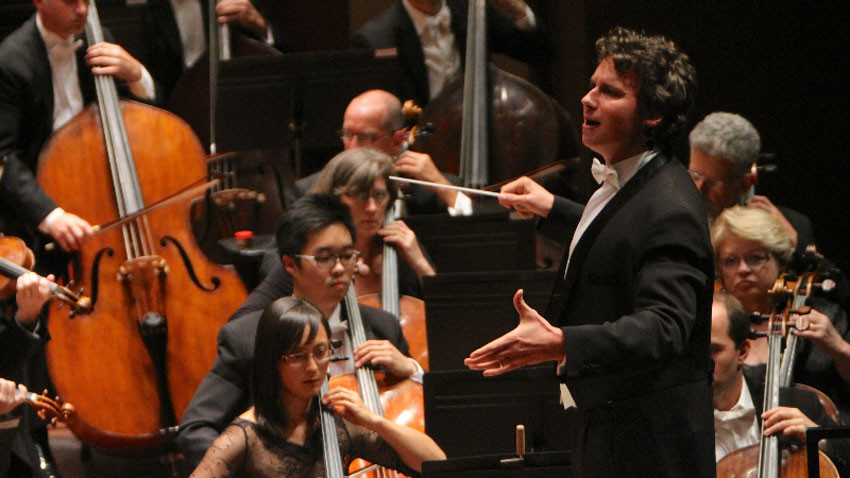
Though still in his early 30s Stilian Kirov’s professional biography is impressive. Since the autumn of 2017 he has been music director of the Illinois Philharmonic Orchestra in the Chicago Southland. He has held the same position in two other orchestras in USA. That same year he won first prize at the Debut Berlin Concert Competition, and made his debut at the Berlin Philharmonic Hall.
On 17 January, in Bulgaria hall, Stilian will be conducting the Sofia Philharmonic for the first time. The programme features Beethoven’s Leonore 3, Piano Concerto No. 2 by Franz Liszt and Symphony No. 4 by Johannes Brahms. Soloist of the piano concerto is Petra Hollaender–Pogády – “one of the promising pianists of her generation praised for her "enviable virtuosity" and "rousing stage-presence", according to the reviews, quoted by the organizers.
“The first rehearsal (on 14 January) with the Sofia Philharmonic was a really wonderful experience – a superb ensemble, a magnificent working atmosphere, making music of the soul, which is so important. It is such a joy to be here, at home. I used to go to the Philharmonic’s concerts every Thursday. I have incredible memories, so many discoveries, inspirations in this very hall,” the young conductor says.
As so many children in Bulgaria, Stilian started playing the piano at an early age – 5. “I had several teachers. They all have their share in my development, but the person I owe most to is Prof. Milena Kurteva who tutored me when I was 13-14,” Stilian says. Then he was admitted to the National School of Music where he studied piano and oboe, and conducting with Deyan Pavlov.
“One of the first symphonies I conducted was Symphony No. 100 by Haydn (also known as the Military Symphony),” Stilian Kirov remembers. “I was really lucky because the teachers supported me in my attempts to conduct the Youth Orchestra and the chamber orchestra of the school. That gave me my first impressions and experience in the profession. When I graduated school I studied at the National Academy of Music for two years. In that time I won a piano competition in Paris and travelled to Paris to study the piano. Later I moved to Paris and there I graduated conducting at the Ecole Normale de Musique withDominique Rouits. Then I was assistant conductor at the Opera de Massy. At one point my teacher advised me to apply to the most prestigious schools in USA. I was fortunate to be admitted to the Julliard School where I graduated orchestral conducting in the class of Maestro James DePreist. After I had graduated I lived in New York for about a year – I played the piano and the organ and taught music. It was not easy to be living in the “centre of the world” and to look for a job. I earned the position of conductor in Memphis, Tennessee, and two years later I joined a major orchestra – the Seattle Symphony.
Stilian spent three years there but then there came the moment when you get “comfortable” a sign for him that he had to change something. He left without finding another job even though he had just become a father. Fortunately he was approved as music director of New Jersey's Symphony in C, inheriting celebrated Bulgarian conductor Rossen Milanov to the post. He earned the same position at the Bakersfield Symphony, California.
“It is so enjoyable to be making music with such good musicians. Though I am constantly travelling and am living out of a suitcase, it is very rewarding. Every orchestra is like an individual human being and it is very useful to be able to work on good music that is so different. I always take the view that we are out on a quest together. To my mind that is the correct approach. Of course, every conductor comes with an image, a sound in his head. That is why it is important to let our minds open up to what we are hearing. You hear and you react – a very important ability that has to be developed. I myself, for example, imagine a given solo in a given way, but the performer who has to play it performs it in a different, much better way. So, I am not going to change it just because I had something different playing in my head before the rehearsal.
And in truth, when it gets “too comfortable” one has to look for new directions. But it is more important to be able to enjoy to the full the opportunity of working with musicians of excellence where you currently are. I have reached just such a point – of making music and developing as an artiste. As Bernard Haitink, one of the mentors I respect most, said it is a never-ending search. And that is the beauty of our profession, because no matter how well you may know a given work, there is always something new to be discovered.”
English version: Milena Daynova
Photo: private libraryOne of the latest songs by the beloved star of several generations, Margarita Hranova, is "Moyat den badi" ("Be My Day"). In it, the singer once again works with Bilyana Chokoeva-Angelova, who is the author of the music and lyrics...
One of the most prominent musicians in the Strasbourg Philharmonic Orchestra is the Bulgarian violist Boris Tonkov. A proven talent, he graduated from the National Music Academy "Lyubomir Pipkov" in Sofia as a student of the legendary Prof. Ognyan..
Born into a musical family, Dani Ilieva has been singing for more than ten years. She has participated in several musical formats, but she considers her greatest achievement to be the award from the National Pop Song Contest “Burgas and the Sea”. Now,..

+359 2 9336 661
